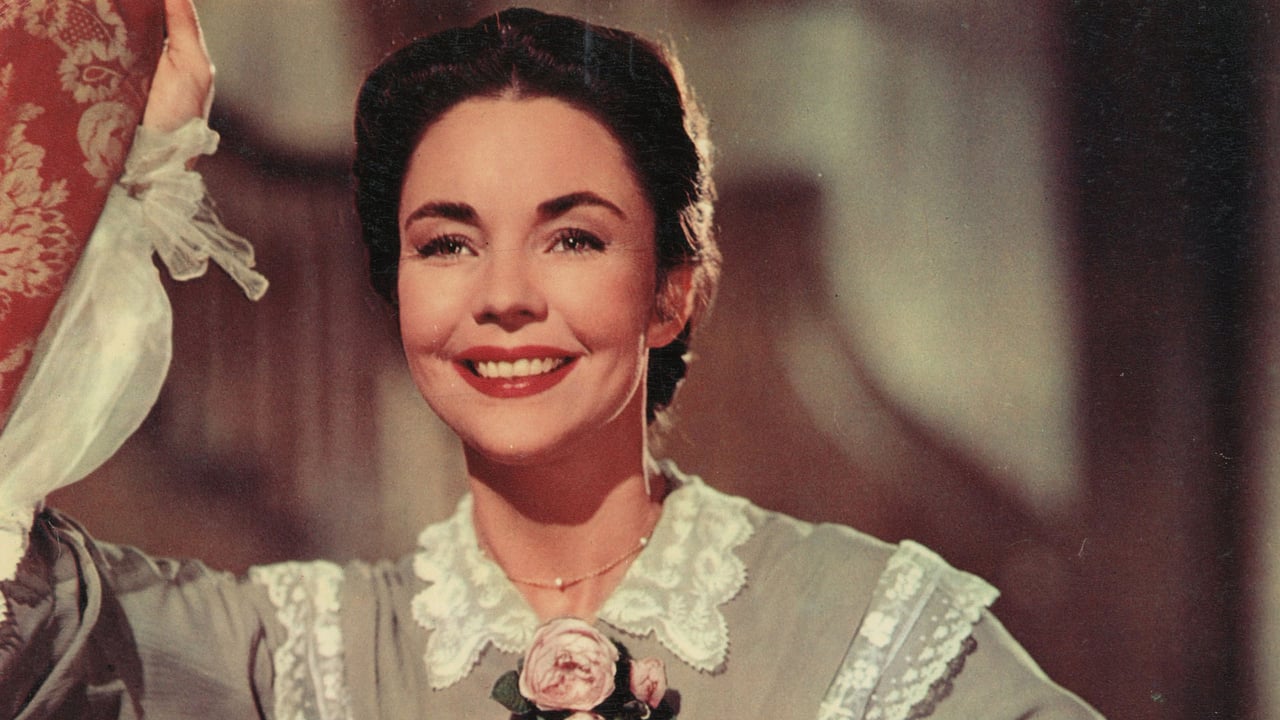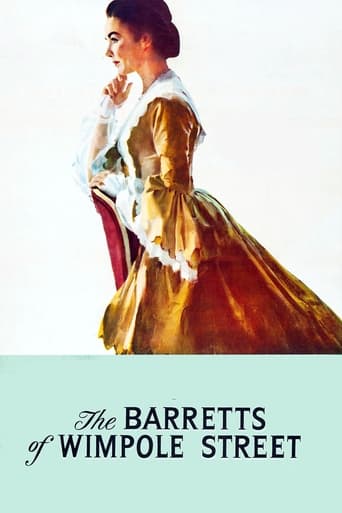

Very Cool!!!
... View MoreBlending excellent reporting and strong storytelling, this is a disturbing film truly stranger than fiction
... View MoreThis movie feels like it was made purely to piss off people who want good shows
... View MoreEasily the biggest piece of Right wing non sense propaganda I ever saw.
... View MoreThis story of the courtship of two poets, the invalid Elizabeth Barrett, and the vital Robert Browning, makes for a very enjoyable couple of hours. It's nice to see a film based on a well-written play, with fine characterizations and good direction. The film is surprisingly suspenseful; apparently mundane, everyday matters absorb us slowly inexorably, until we realize they are matters of life and death. As Elizabeth Barrett, Jennifer Jones gives one of her finest portrayals. Unfortunately, it's not one she's especially remembered for, because the movie doesn't seem to be shown all that much. As Elizabeth Barrett, she's required to be the emotional center of the film, and she accomplishes that, with great warmth and simplicity. You'll find yourself rooting for her. Though she's the one American in an all-British cast, she never comes across a Barrett from Hollywood Boulevard.The great John Gielgud is a bit more problematic in the role of Moulton Barrett, the tyrannical father the large Barrett brood lives in fear of upsetting. At this point, Gielgud, though he had appeared in films, had not especially mastered (or so it would appear) the subtle technique of performing for the camera. He's not bad, but he's stagy. And I also wonder if he's the best choice for the role. But at least he's strong, and makes his presence felt. This works for the film far more than it detracts.The film also features the married team (though I'm not sure if they were, at the time) of Bill Travers and Virginia McKenna, later the stars of Born Free. Travers plays Robert Browning; he may not be everyone's idea of Browning, but he's a good actor and he has a lot of energy. McKenna plays the role of the younger sister that was played in the 1934 version by Maureen O'Sullivan. The two performances could not be more different; O'Sullivan playing the frightened little ingenue (quite well, it must be said), and McKenna playing it much more internally and with a stillness and a subtle fear. It's a very fine performance.The supporting cast is uniformly good. Sidney Franklin (who hadn't directed a film in 20 years) does a beautiful job. The sets and costumes, in color and CinemaScope, are perfect.I really enjoyed it.
... View MoreThis version of The Barretts Of Wimpole Street lacks for nothing, it's certainly an improvement over the 1934 version in a technical sense with the wide screen and color. It even has the same musical theme that Herbert Stothart wrote for the earlier version that starred Norma Shearer, Fredric March and Charles Laughton.Jennifer Jones was following in some mighty big footsteps in portraying Elizabeth Barrett. Not only Norma Shearer's, but Katherine Cornell who originated the role in the original Broadway production in 1931 which ran for 370 performances in those Depression years. That is something that should tell you more than anything else about how good this play is. Jen creates her own sense of intelligent regal beauty as the frail poetess who summons up the courage and strength to stand up to her tyrannical father.Charles Laughton was widely quoted as saying that in his portrayal of the issue ridden Moulton Barrett, the censors couldn't censor the gleam in his eye to get past the Code. The Code by 1957 was cracking and John Gielgud used a couple of direct physical moves rather than camera closeups to show his incestuous feelings for his daughter. Gielgud still gives a fine account of himself, though Mr. Laughton set the standard for that role. On stage it was originated by Charles Waldron who moviegoers will best remember from his last part as General Sternwood in The Big Sleep.Bill Travers plays a somewhat different Robert Browning than Brian Aherne on stage and Fredric March on the screen. Both of those men are refined types and Browning is a bit more boisterous in this film than he was in the previous one. Still he's ready to do right by Jones and take her from the tyranny she lives under.Though the 1934 film is an MGM classic, none of the people associated with this version have anything to be ashamed about. This is a story that could be made today. I can see the casting already, Hugh Grant as Robert Browning, Kate Winslet as Elizabeth Barrett, and Tom Wilkinson as Moulton.I'd pay for a ticket to that. Until then we have two very good classic screen versions.
... View MoreI thought this was a very good movie. I always found it amazing that Jennifer Jones was so effective in it as she was hardly a young woman when making this movie. Nevertheless, you hardly notice it and she is really excellent in it. I also thought Gielgeud (I think I am misspelling his name!) and McKenna were also excellent. I love when she is able to tell him after he orders her to get the dog to kill it, "She took Flush with her." It is such a triumph for Barret, for the sister, and of course for Flush too!!! Another reviewer mentioned that they kept thinking of The Heiress in watching this movie. I have thought so too at times. I feel De Haviland would have been great in this role, or actually in a few other of Jones' roles over the years too (Good Morning Miss Dove, Love Letters, and Cluny Brown all come to mind). But Jones was wonderful in each and in this one too. She certainly makes one seek out some of Barret and Browning's poems.
... View More"The Barretts of Wimpole Street" (1957) tells the story of the romance of real-life poets Elizabeth Barrett and Robert Browning, despite many odds. In 1840's London, the Barrett household is one of fear and unhappiness. Elizabeth, (Jennifer Jones) the oldest child of the family, has been sick and forced to stay in her bedroom for the last several years. Also in the household are her two sisters and five brothers, all of whom are under the thumb of their tyrannical father, Edward (John Gielgud) a widower who found that since he lost the love of his life, he would not allow any of his children to marry either, in particular, Elizabeth, the one daughter who he claims to love. Elizabeth has been corresponding with a young poet Robert Browning (Bill Travers), however, and finds that the more she falls in love with him, the healthier she gets, but the healthier she gets, the more desperate and tyrannical her father gets.The story as I told it sounds like it could be kind of interesting and fun in a high-drama type way, which is what I was expecting, but it actually was pretty boring. And when it wasn't boring, it was creepy. Gielgud is a great actor of course, and was great as Robert Browning, a man who needed to look up Freud in a couple of decades. His devotion and stranglehold on Elizabeth was actually pretty disturbing, particularly when his desperation grew to a fever pitch at the end of the film. I have never liked Jennifer Jones, and I didn't like her in this movie. I'm not sure what it is about her exactly, other than the fact that I consider her a mediocre actress perhaps it is because she always has this look on her face that is a weird cross between anguish and when you feel a sneeze coming on. With a story as bizarre as this one, so much more could have been done to make this film a good one, but unfortunately it just turned out mediocre at best. 4/10 --Shelly
... View More